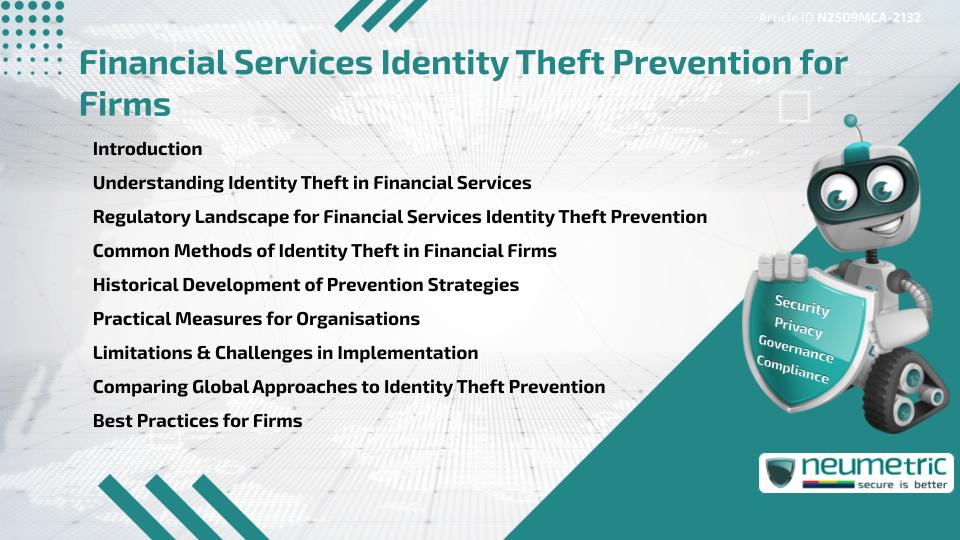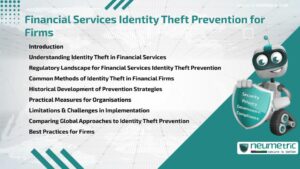Table of Contents
ToggleIntroduction
Financial Services Identity Theft Prevention is a critical requirement for firms handling sensitive Customer Data. With growing digital adoption, Financial institutions face increasing Risks of fraud, unauthorised access & data misuse. Laws & Regulations mandate robust safeguards to protect Client information, with penalties for non-Compliance. Understanding prevention strategies helps firms protect their Clients, build Trust & avoid Legal consequences.
Understanding Identity Theft in Financial Services
Identity theft occurs when personal or Financial Information is stolen & misused for fraudulent purposes. In Financial Services, it can include unauthorised access to bank accounts, credit card fraud or misuse of investment credentials. Since firms deal with high-value Assets & sensitive Client details, they are prime targets for cybercriminals.
Regulatory Landscape for Financial Services Identity Theft Prevention
Many countries, including India, the United States & members of the European Union, enforce strict regulations on Data Protection in the Financial sector. For example, the Reserve Bank of India issues Cybersecurity guidelines, while the United States enforces the Gramm-Leach-Bliley Act. These frameworks require firms to implement strong identity verification, encryption & monitoring practices. Financial Services Identity Theft Prevention is not just a Compliance requirement but also a reputational necessity.
Common Methods of Identity Theft in Financial Firms
Cybercriminals use several methods to target Financial institutions:
- Phishing attacks through fraudulent emails
- Social engineering to trick Employees
- Malware & ransomware to access Databases
- Credential stuffing using stolen login details
- Insider Threats from compromised staff
These tactics highlight the need for continuous vigilance & Employee Training.
Historical Development of Prevention Strategies
Identity theft in Financial Services is not new. Earlier, physical theft of bank records was common. As digital transactions increased, cyber-enabled fraud became widespread. Over time, firms adopted Firewalls, Multi-factor Authentication & Fraud Detection algorithms. Each wave of technology brought new Threats, requiring firms to evolve prevention strategies continuously.
Practical Measures for Organisations
Firms can implement Financial Services Identity Theft Prevention through:
- Multi-factor Authentication for Client logins
- End-to-end Encryption of Financial data
- Real-time Fraud Detection systems
- Employee Awareness & Phishing simulations
- Regular Third Party Security Audits
These measures reduce both external & internal Risks while ensuring Compliance with regulatory requirements.
Limitations & Challenges in Implementation
Despite technological advances, prevention faces hurdles. Smaller firms may lack resources for advanced Cybersecurity tools. Jurisdictional challenges arise when fraud originates from outside the country. Human error remains a leading factor in successful breaches. Balancing Client convenience with robust security also poses challenges.
Comparing Global Approaches to Identity Theft Prevention
The European Union’s General Data Protection Regulation [GDPR] emphasises Data Minimisation & Client consent, while the United States relies on sector-specific regulations like the Fair Credit Reporting Act. India’s Framework is evolving, with guidelines from the Reserve Bank of India & sectoral regulators. Compared globally, Financial Services Identity Theft Prevention in India is catching up but requires stronger enforcement.
Best Practices for Firms
To safeguard against identity theft, firms should:
- Deploy advanced fraud analytics tools
- Train Employees to detect Phishing attempts
- Encourage Clients to use strong, unique passwords
- Maintain updated Incident Response plans
- Regularly review Compliance with Data Protection laws
These practices not only reduce Risks but also strengthen Client trust in Financial institutions.
Takeaways
- Financial Services Identity Theft Prevention is essential for Regulatory Compliance & Client trust.
- Methods of identity theft include Phishing, Malware & insider Threats.
- Regulatory frameworks worldwide impose strict requirements on Financial firms.
- Challenges include resource constraints, jurisdictional issues & human error.
- Firms must adopt a layered approach to prevention through technology, training & Governance.
FAQ
What is Financial Services Identity Theft Prevention?
It refers to measures taken by Financial firms to protect Client data from theft, misuse & fraud.
Why are Financial firms prime targets for identity theft?
They handle high-value assets & sensitive Client information, making them attractive to cybercriminals.
What regulations guide Financial Services Identity Theft Prevention?
Regulations include Reserve Bank of India guidelines in India, GDPR in the European Union & the Gramm-Leach-Bliley Act in the United States.
How can firms detect identity theft attempts?
They can use real-time monitoring systems, Fraud Detection analytics & anomaly tracking in Client activities.
Do small firms also need to follow prevention guidelines?
Yes, all Financial firms, regardless of size, must comply with regulations & protect Client data.
What role do Employees play in prevention?
Employees are the first line of defense through awareness, training & adherence to Cybersecurity protocols.
Can Clients contribute to preventing identity theft?
Yes, by using strong passwords, enabling multi-factor authentication & being cautious with suspicious messages.
Need help for Security, Privacy, Governance & VAPT?
Neumetric provides organisations the necessary help to achieve their Cybersecurity, Compliance, Governance, Privacy, Certifications & Pentesting needs.
Organisations & Businesses, specifically those which provide SaaS & AI Solutions in the Fintech, BFSI & other regulated sectors, usually need a Cybersecurity Partner for meeting & maintaining the ongoing Security & Privacy needs & requirements of their Enterprise Clients & Privacy conscious Customers.
SOC 2, ISO 27001, ISO 42001, NIST, HIPAA, HECVAT, EU GDPR are some of the Frameworks that are served by Fusion – a SaaS, multimodular, multitenant, centralised, automated, Cybersecurity & Compliance Management system.
Neumetric also provides Expert Services for technical security which covers VAPT for Web Applications, APIs, iOS & Android Mobile Apps, Security Testing for AWS & other Cloud Environments & Cloud Infrastructure & other similar scopes.
Reach out to us by Email or filling out the Contact Form…





